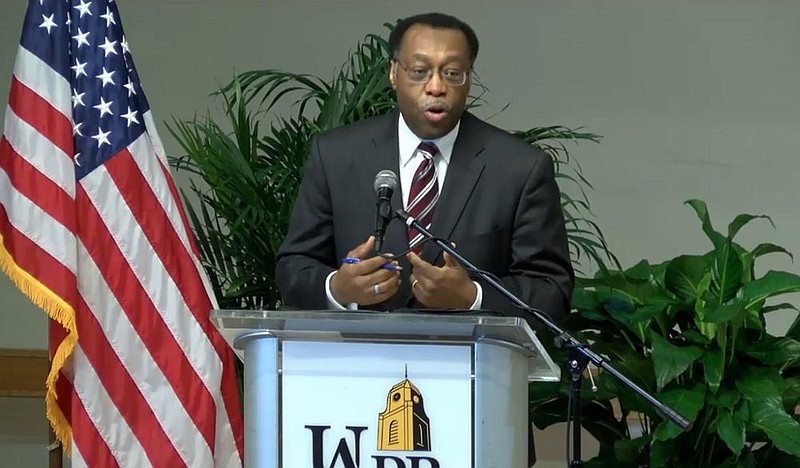The University of Arkansas Pine Bluff honored Constitution Day, an American federal observance that recognizes the United States Constitution and those who became U.S. citizens, by hosting a virtual event Thursday morning.
Guest speaker Lavenski R. Smith, chief judge to the United States Court of Appeals for the Eighth Circuit, spoke on the Constitution to a limited crowd in Cross-Phipps Lecture Hall and a virtual audience on Youtube live.
Smith, who has served as chief judge of the court since 2017, was the first Black jurist to hold that position in the Eighth Circuit.
Diving straight into the Constitution, Smith said the Constitution was never perfect, and the preamble to the document stated its creation was to form, not a perfect union, but a more perfect union.
"It remains imperfect," said Smith, stating there have been conflicting viewpoints leading to debate and division. "It will never be perfect so long as it is human."
Smith said the Constitution was nevertheless the foundation for the national government's move toward the ideal of liberty.
"The power and beauty of those self-evident truths did not describe the initial conditions for everyone in the United States but it did set the aspiration," said Smith.
Taking the audience back in time to the South when a significant amount of the population was not free, Smith explained how the government wanted to count those enslaved but only at three-fifths.
The Three-Fifths Compromise was a compromise reached among state delegates during the 1787 United States Constitutional Convention. The compromise proposed that slaves be counted when determining a state's total population for legislative representation and taxing purposes.
The population number would determine the number of seats that the state would have in the House of Representatives for the next 10 years. The compromise solution was to count three out of every five slaves as people for this purpose. Its effect would give the Southern states a third more seats in Congress and a third more electoral votes.
"They wanted to count them but not give them any rights," said Smith.
The Constitution became the fundamental framework of America's system of government, creating one that puts the power in the hands of the people.
It separated the powers, set up a system of checks and balances, divided power between state and federal government, and outlined many rights and freedoms for the people.
But not all people.
"It didn't mention slaves," said Smith who pointed out that some Blacks in the U.S. were free. "The word slave doesn't even appear in the Constitution," he said.
The Bill of Rights, the first 10 Amendments, guarantees civil rights and liberties and specifies that the enumeration in the Constitution of certain rights shall not be construed to deny or disparage others retained by the people.
"It was described so the federal government could see this is what you cannot do. We are giving you power. We are giving you authority but these things you cannot do," said Smith, with passion in his voice. "They're not written in terms as the government is giving people these rights--government, these are the people's rights and you cannot infringe upon them."
Smith said the Constitution was the initial document of slavery, but slavery still endured in the South, describing it as holding a wolf by its ears.
"You can't let it go, but you got to keep holding it but you can't keep holding it," said Smith. "At some point, there's going to be a fight."
That fight resulted in the Civil War. After decades of tension between northern and southern states over slavery, the Civil War began.
"The Supreme Court missed a great opportunity to end the injustices of slavery," said Smith who went on to discuss the amended Constitution after the war.
As he focused his narrative on voting, he acknowledged the amendments that address specifically the right to vote.
"The 15th, 19th, and 20th Amendments all directly address the right to vote," said Smith. "Voting is absolutely essential.
Smith said in order to have a government of the people, by the people and for the people and not over the people, individuals who participate in government must be able to do it in an effective manner.
Though progress has been made, Smith declares progress will only continue if the people in place are for every race, every background and every ethnicity. He said the government must represent all the people, giving them all of the rights that the Constitution guarantees.
Stating that society "cannot remain free and ignorant," Smith said if Americans want to be free, education is the answer.
"I don't necessarily mean obtaining degrees," said Smith . "I mean obtaining understanding of the operations of government, understanding what rights and privileges you have and participating in it."
Smith closed by encouraging the audience to acquire a skill, whether that is through an academic profession or a trade.
"You need to involve yourself in a free economy by having the means to trade a valuable, powerful service," said Smith. "With that, you will understand the operation of the economy, the government and you can have resources that will enable you to participate vitally."

